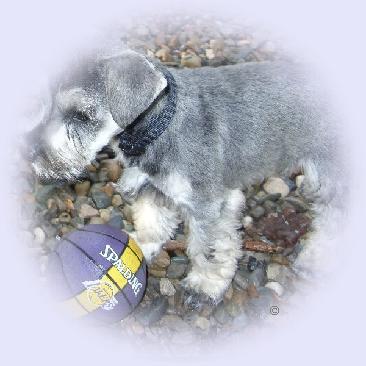
Fun & Games
Games to play
Fetch
Everyone knows how this one works. Fetch games are great exercise and fun, and help you to teach your puppy to come back to you. Do make sure that they bring the toy all the way back, and ask them to give it to you before it is thrown again.
Don’t let them teach you to fetch for them. Introduce a ‘sit’ or a ‘down’ occasionally, rather than just throwing the toy again when your dog commands it.
This will keep you in control, and maintain variety.
Fetch
Everyone knows how this one works. Fetch games are great exercise and fun, and help you to teach your puppy to come back to you. Do make sure that they bring the toy all the way back, and ask them to give it to you before it is thrown again.
Don’t let them teach you to fetch for them. Introduce a ‘sit’ or a ‘down’ occasionally, rather than just throwing the toy again when your dog commands it.
This will keep you in control, and maintain variety.

Playing with your puppy’s toys is as important for you as ‘pack leader’ as it is for the pup, through playing with our dogs we learn more about them, enabling us to build a strong bond of friendship and, above all have fun. Toys and games are a useful tool, which will help you to mould and shape your puppy into the adult dog you wish to spend over the next decade with.
Keep the best toys for yourself
One rule for playing with any dog is that you should always be in control. If you take charge of the games your puppy will grow up to respect you and enjoy playing with you; let them take charge and you could have real difficulty training them. There is no reason why they shouldn’t have a few toys, such as nylabones or kongs to mess around with on their own, but keep the best toys for you. Keep the toys in a special box, out of your dog’s reach so that you can bring them out when you wish to play. As pack leader, it is your right to choose who you share ‘your’ special toys with, and when you wish to play. As pack leader, you will win most games, and you will always keep the toys for yourself at the end. Let your puppy have a small victory occasionally, it’s no fun if you always lose, but the toys are always put out of reach at the end.
If you find that your puppy is always snatching the toys and running away with them to their ‘den’, attach a light line to them while you play so that you are able to stay in control, by gently guiding them back in to the game. If they won’t give up a toy, don’t make an issue of it. Switch your attention to another toy, pretend to examine the new toy, or toss it around, ignoring the one your puppy has. Soon your toy will become the very best in the whole world, and the previous toy will be forgotten as your puppy comes running to join in the new game. Ask them to sit before sharing your new toy with them and gather the original toy up at the end of the game, when it has been completely forgotten. In this way, you will have kept control of the situation, kindly but firmly making the point that you will not allow them to manipulate you.
Choose when to play
Play with your puppy often. Several short play times a day is better than one long game which leaves your puppy exhausted or bored at the end. Stop the games while your pup is still having fun, so that they are always eager to join in a game and will remain far more attentive to you, always on the lookout for the next playtime.
The serious side of play
Use your toys as training tools to help you mound and shape the puppy’s behaviour. Incorporate small training exercises into your games, such as asking the pup to ‘sit’ or ‘down’ at the beginning of a game or before you throw a ball. Similarly, you can incorporate toys and games into training sessions, by using a short game with a favourite toy as a reward for coming, instead of a food treat or as a focus of attention when practicing heel work.
Take some of your special toys with you on walks. Teaching your pup to play with you when you are out will keep walks interesting and encourage the puppy to focus on you rather than on mischief. Arm yourself with toys that can easily be whipped out of a pocket to distract your puppy form trouble, a favourite squeaky which is more interesting than a rabbit next to a railway line can literally save your dog’s life.
Toys and games are important to your puppy. Toys and games encourage your puppy to play and, through play, they learn. Puppies which do not have many toys will quickly start finding their own, a toilet roll, a shoe etc…